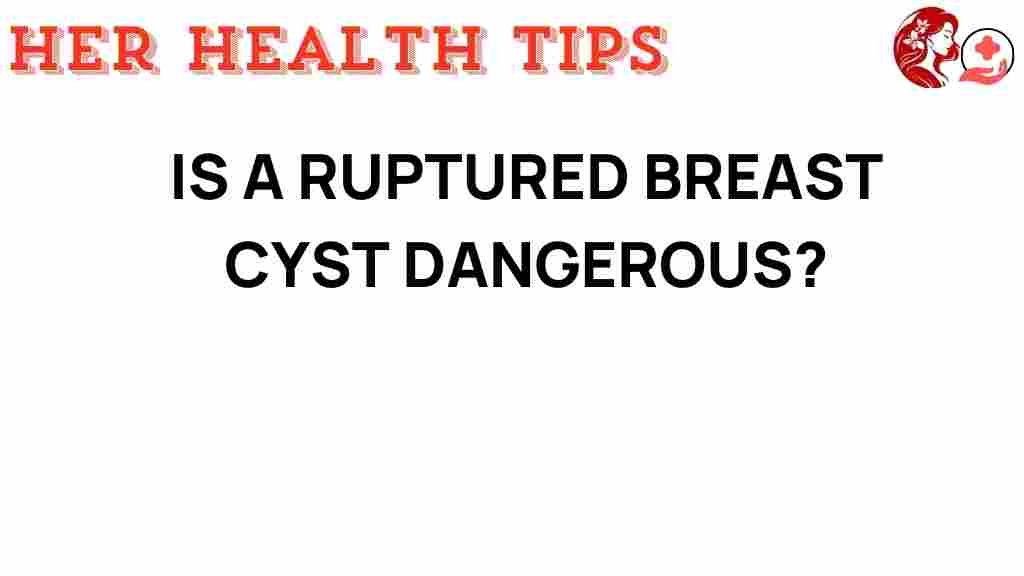The Truth Behind a Ruptured Breast Cyst: Should You Be Concerned?
Breast health is a crucial aspect of women’s health, and understanding the conditions that affect it is essential. One such condition is a ruptured breast cyst. If you’ve found yourself wondering about the implications of a ruptured breast cyst, you’re not alone. This article will explore the symptoms, diagnosis, treatment, and health risks associated with ruptured breast cysts, providing you with valuable medical advice and insights into effective cyst management.
What is a Breast Cyst?
A breast cyst is a fluid-filled sac that develops in the breast tissue. They are typically benign (non-cancerous) and can vary in size. Many women may experience breast cysts at some point in their lives, especially during their reproductive years. Understanding the nature of these cysts is essential for proper breast health.
Types of Breast Cysts
- Simple Cysts: These are filled with fluid and have smooth walls. They are usually benign.
- Complex Cysts: These may have solid components or irregular walls and may require further evaluation.
While breast cysts are common, a ruptured breast cyst occurs when the cyst breaks open, releasing its contents into the surrounding tissue. This can lead to various symptoms and health concerns that need to be addressed.
Symptoms of a Ruptured Breast Cyst
Recognizing the symptoms of a ruptured breast cyst is vital for timely diagnosis and treatment. Common symptoms include:
- Sudden Pain: A ruptured breast cyst can cause sharp or sudden pain in the breast area.
- Swelling: You may notice swelling or tenderness around the cyst site.
- Change in Size: The size of the breast cyst may change abruptly.
- Fluid Leakage: In some cases, you might see a discharge from the nipple.
If you experience any of these symptoms, it’s essential to consult a healthcare professional for assessment.
Diagnosis of a Ruptured Breast Cyst
Diagnosing a ruptured breast cyst typically involves several steps:
- Medical History: Your doctor will ask about your symptoms and medical history.
- Physical Examination: A thorough examination of the breast will help identify lumps or painful areas.
- Imaging Tests: Ultrasound or mammography may be used to visualize the cyst and assess its condition.
These diagnostic tools aid in determining whether a cyst is ruptured and whether it poses any health risks.
Health Risks Associated with a Ruptured Breast Cyst
While most ruptured breast cysts are benign and do not cause severe health issues, there are some risks to consider:
- Infection: If the cyst contents leak into surrounding tissue, there is a small risk of infection.
- Inflammation: The body may react to the spilled fluid, causing swelling and inflammation.
- Recurrence: Ruptured cysts may recur, leading to repeated episodes of discomfort.
It’s crucial to monitor your symptoms and consult a healthcare provider if you have concerns about your breast health.
Treatment Options for a Ruptured Breast Cyst
Treatment for a ruptured breast cyst largely depends on the severity of symptoms and whether complications arise. Possible treatment options include:
1. Observation
If the symptoms are mild, your doctor may recommend simply monitoring the situation. Many ruptured cysts resolve on their own without any intervention.
2. Pain Management
Over-the-counter pain relievers such as ibuprofen or acetaminophen can help alleviate discomfort associated with a ruptured breast cyst.
3. Aspiration
If the cyst is large or causing significant pain, a healthcare provider may perform a procedure called aspiration. This involves using a needle to withdraw fluid from the cyst to relieve pressure and discomfort.
4. Surgical Intervention
In rare cases where the cyst is complex or if there are concerns about infections or other complications, surgical removal may be necessary.
Always seek medical advice to determine the best course of action for your specific situation.
Cyst Management and Preventive Measures
Managing breast cysts effectively can help reduce the likelihood of ruptures and associated complications. Here are some tips for cyst management:
- Regular Breast Exams: Conduct regular self-exams to monitor any changes in your breast tissue.
- Routine Check-ups: Schedule regular appointments with your healthcare provider for professional breast examinations.
- Healthy Lifestyle: Maintain a balanced diet, exercise regularly, and limit caffeine and salt intake, as they may contribute to cyst development.
- Educate Yourself: Stay informed about breast health and any changes in your body. Knowledge is a powerful tool.
For more information on breast health and cyst management, check out this helpful resource.
When to Seek Medical Advice
If you suspect that you have a ruptured breast cyst or are experiencing any concerning symptoms, it is essential to seek medical advice promptly. You should consult a healthcare provider if you notice:
- A sudden increase in breast pain or swelling.
- Changes in the appearance of your breast or nipple discharge.
- Persistent symptoms that do not improve with over-the-counter pain relief.
Early intervention can help prevent complications and ensure optimal breast health.
Conclusion
A ruptured breast cyst can be alarming, but understanding the symptoms, diagnosis, treatment options, and health risks can alleviate your concerns. Most ruptured cysts are benign and manageable with proper medical advice and cyst management strategies.
Always prioritize your breast health by staying informed and seeking regular check-ups. If you experience any symptoms related to a ruptured breast cyst, don’t hesitate to reach out to your healthcare provider for personalized advice and care.
Remember, your health is your wealth—take the necessary steps to ensure it remains a priority.
This article is in the category Conditions and created by HerHealthTips Team
